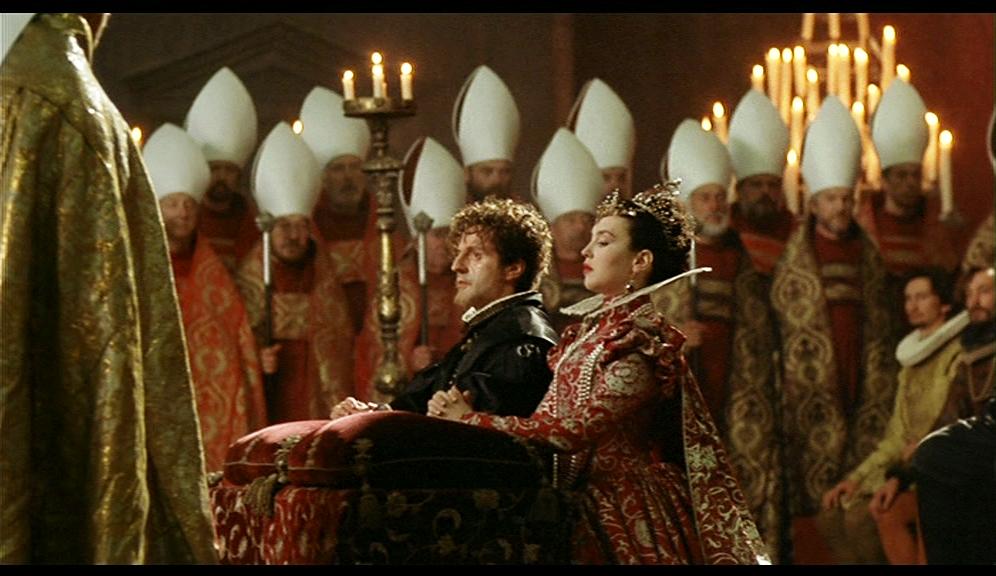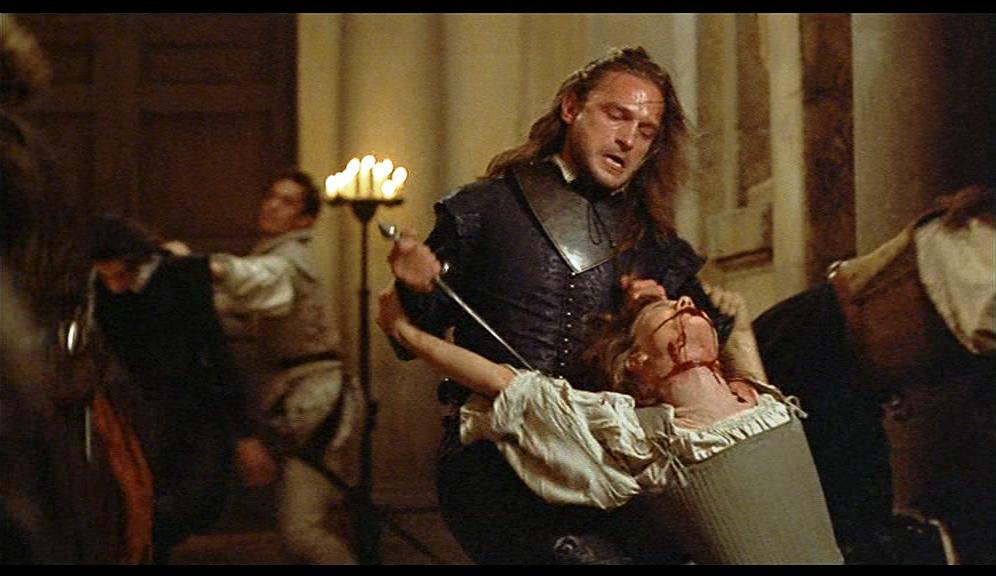
Patrice Chereau’s elaborate, expensive take on the costume epic, an extension of the grimier, would-be honest period films of the ’60s and ’70s, seems now in its turn to have had a swift influence on subsequent gritty historical movies, like Shekhar Kapur’s Elizabeth

Built around a bloodcurdling recreation of the infamous St Bartholomew’s Day Massacre of 1572,Queen Margot doesn’t hesitate in plunging into a busy, turbulent era and milieu, but manages to make the tangle of events and persons fairly lucid, as it’s played less for exploring religious and historical motives than for explicating far more graspable matters of influence and power. The film begins with the wedding of Marguerite de Valois (Adjani), nicknamed Margot and sister to the French King Charles IX (Jean-Hughes Anglade), to the Protestant king of Navarre, Henri de Bourbon (Auteuil). The union is masterminded by Margot’s mother, the fearsome, Machiavellian Catherine de Médicis (Virna Lisi) to placate the factional schisms. Marguerite, a lusty lady, rejected by her former lover now that she’s married and morally compelled to give her new husband some level of political support, but refusing to sleep with the prickly, unprepossessing Henri, ventures out into the night and has a mind-blowing knee-trembler with Protestant pretty-boy pick-up La Môle (Vincent Perez).

Events, however, soon snowball as Catherine’s determination to extract her weak-willed son from the influence of his new Protestant favourite, Admiral Coligny (Jean-Claude Brialy), provokes her to attempt Coligny’s assassination, immediately unravelling the accord the marriage has temporarily achieved, and Catherine, with the collusion of her more vicious, incestuously passionate son Henri of Anjou (Greggory) and other henchmen, commences the massacre. Henri escapes thanks to the aid of Margot, with whom he’s struck up a political bargain, and she also saves La Môle from the roaming gangs of murderous thugs. Henri converts to save his neck and soon becomes Charles’ most endeared friend after he saves his life during a hunting ride, making his assassination more desperately important than ever for Catherine, whilst La Môle tries to pull off a rescue of both Henri and Marguerite from the clutches of Catherine’s cabal.

It’s history played as bruising survival contest, and so many elements vie for attention in turn that it threatens to break up into separate tales. Not helping is the fact that its central fixation with the Beautiful-People-Fucking glory of Adjani and Perez is hamstrung by Perez’s flat character. His simplistic ardency is far less interesting than the politicking going on around him, and Chereau’s realistic bent prevents him from engaging in the kind of invigorating swashbuckling usually offered in such films, providing rather bone-jarring brutality, and whirling, frenetic duels. Perez, although cool-looking and properly gallant, was much more affecting as the out-of-his-depth male bimbo in Cyrano, and he is out-acted effortlessly by Auteuil, whose shrewd, nuanced characterisation makes him the vital figure he needs to be as the future, beloved King Henri IV.

Keeping pace with him are some other excellent turns, especially Lisi’s Cannes award-winning performance as the endlessly manipulative matriarch, finally shattered by her own merciless efforts to secure her hegemony and her perverse impulses towards her sons, who have been twisted into a variety of dysfunctional forms. Anglade is memorable too, as sweaty and intense here as he was in his other great performance of 1994, in Roger Avary’s Killing Zoe, as the emotionally contorted, finally doomed Charles. Chereau’s regular collaboration with Greggory, extended memorably by his part as the panicked bourgeois husband in Chareau’s impressive 2005 film Gabrielle, sees Greggory relishing his sleazy, nakedly villainous prince here.

Queen Margot aspired to be a thrilling, definitively modernist reinvention of the historical-yarn tradition of which Dumas was of course the master, and the thought of something like the same style being unleashed on The Three Musketeers could be the only justification for making another version of that warhorse. Taking Dumas’ melodramatic version of history and subjecting it to a tactile, de-romanticised make-over is both an intriguing choice and yet finally a slightly tone-deaf one, because there’s less than meets the eye with some of this. Nonetheless, Chereau, a confirmed eroticist, effectively emphasises a time defined by physicality at every opportunity, as bodies bleed, perspire, and orgasm copiously, and sex, violence, religion and politics all flavour each-other. Chereau also attempts purposeful, final rejection of the kind of formal elegance long associated with this type of film, defined by an indelicate, often artfully haphazard visual approach, framings filled with teeming, busy, flowing detail, and sequences laced with bristling, hacking edits, another contribution of the film to a lexicon other directors would draw on to make historical films seem less starchy.

The massacre set-piece is appropriately vivid and cruel, as the main characters flee and search in fright as throats are slashed and lances penetrate bodies regardless of sex and with terrible enthusiasm, the film-makers offering some amazingly achieved gore effects. But the screenplay, by Chereau and Daniele Thompson, doesn’t always find a satisfying balance between intimate drama and showy, overripe spectacle. “Now I know what hate is,” Henri murmurs after the massacre: “Well, learn what hypocrisy is too,’ Marguerite advises, in one of the sharpest lines. The horror of the massacre and the impact of the repugnant behaviour of so many of these noble historical personages would have been most effective in a film essayed with a cooler, more metric approach, and indeed in his subsequent, more intimate works Chereau has wielded a subtler, chillier viewpoint. Here, the proliferation of plots, killings, full-bore sex scenes, threatened incestuous rapes, poisonings (young Argento, utterly lovely, appears in a minor role as a victim of one such dastardly plot), betrayals and turns of allegiance threaten then to ring a little hollow, as a blockbuster approach to the classical blood-and-thunder bodice-ripper.

The film’s final phases, with Charles dying of his own mother’s mis-administered poison, and Marguerite anxiously trying to save La Môle’s head from the chopping block, finally lack conspicuous tragic weight, in part because they drag on, and in part because there’s an ill-defined quality to how Marguerite and her only half-way decent brother relate (some of these aspects begging for more elucidation may be a product of the film’s curtailing from its optimum original cut, and there are notoriously inconsistent edits of the film available). Adjani’s lead performance is both vigorous and impressive and yet, like the film, just a touch too overstated: she throws herself around a lot, heartbreakingly lovely in flesh, with her long black hair constantly whipping about in her face like some J-Horror wraith, but her emotional showiness in such a ready-made grande dame role, and her character’s reactive personality make her somehow unengaging as a tragic figure.

Queen Margot is, nonetheless, a very good film, and these faults more the kind that keep a movie just shy of greatness rather than condemn it to ignominy. Fine little vignettes stud the narrative, like Catherine coolly thanking Henri for saving Charles’ life, manipulating Charles into doing her bidding with expedient skill, and kissing Anjou in shivering, forbidden ecstasy. Particularly engaging are moments in the sub-plot of Catholic hit-man Coconnas (Claudio Amendola), encouraged laughingly by Marguerite’s flirty, solicitous friend Henriette de Nevers (Dominique Blanc), lays waste to Huguenots on the street in a scene of giddy horror, and then later, desperately prostrates himself at La Môle’s feet to beg forgiveness after the pair have failed to kill each-other in a duel. Whilst the work as a whole is not finally as exciting or enriching as its scale and force argue, it’s still an experience.

